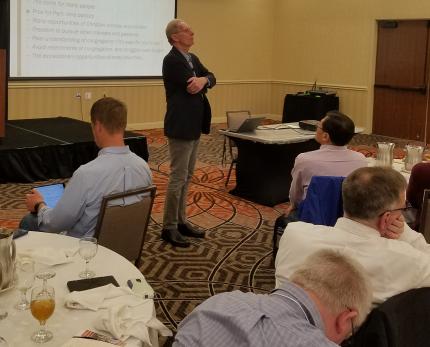Looking at the Challenges and Necessity of Being a Bivocational Pastor

Len Vander Zee speaks at bivovational ministry conference.
Chris Meehan
God considers all work holy and that no job or vocation is of higher value than another, said Len Vander Zee, former editor-in-chief of Faith Alive Christian Resources, in the opening session of a two-day conference on bivocational ministry.
Over the centuries the term vocation has often been associated with clergy, implying that other people “are mere workers who have little or no spiritual significance” in the jobs they do, said Vander Zee, who served for 37 years as a pastor before his post at Faith Alive.
“The fundamental vocation for human beings is to take what God has created and to make something good or useful out of it. All God-honored work is good.”
Sponsored by the Christian Reformed Church’s Financial Shalom Project, the event was titled “What Role Will Bivocational Ministry Play in the Future of the CRCNA?” and drew pastors, seminary professors, and others to a conference center in Grand Rapids.
Running Apr. 24-25, the event was offered in response to the changing nature and needs of churches, said John Bolt, chief financial officer of the CRCNA.
“Ministry today is not the same as it was even a few years go,” said Bolt. “The goal of the conference is to have a broad spectrum of voices at the table as we discuss this issue and what it means for the future of the Christian Reformed Church.”
Hugh Halter, an author, founder of the global ministry Missio, and the lead pastor of Adullam church in Denver, was to speak near the end of the conference, offering a perspective on how bivocational ministry is growing, often out of financial need but also because of powerful moves by the Spirit, in churches across North America.
“If the decline in the American church continues at present pace, the future leaders of God’s church will be plumbers, school teachers, stay-at-home moms, and business owners," Halter says in his book Bivo: A Modern-Day Guide for Bi-vocational Saints.
“Very few are talking about it yet, but thousands of pastors are opting for a bivocational lifestyle.”
This is true with church planters in the CRC; it is very difficult for anyone to start a new church or even help sustain a smaller church without outside income. With this in mind, several church planters with Resonate Global Mission were on hand for the conference and Resonate leaders led some of the sessions.
Launched in early 2017, the CRC’s Financial Shalom project is funded by a $1 million grant from Lilly Endowment Inc.’s “National Initiative to Address Economic Challenges Facing Pastoral Leaders.”
Among other things, the project is helping pastors with specific financial burdens such as paying for medical emergencies, helping with mortgage payments, and assisting pastors facing unforeseen financial crises. The project can also help pastors with Christian day school tuition, salary supplements, setting up retirement accounts, and connecting with a financial counselor.
Further, the project provides a range of financial resources and training programs, including one that will be available soon for pastors considering bivocational ministry.
In his presentation, Vander Zee also spoke about the word “call” and what it meant to him.
Though he had been ordained and serving churches, he said, he kept wondering why he, unlike so many others, didn’t seem to have had a dramatic and clear call by God to be a minister.
But he kept reading the Bible, and especially took in the words of Paul, who was both a disciple and a tentmaker, and he found some real clarity as he read Frederick Dale Bruner’s Commentary on Matthew.
That book reminded him of how Jesus called his disciples, many of them fisherman, and that he called all who follow him to do his work among all people, in all places — and that being ordained wasn’t part of it.
In his own case, Vander Zee said, he finally realized God had called him to ministry work because, given his gifts and talents, it was a way for him “to make something useful” with his life.
Vander Zee said he also learned from John Calvin, who believed that the Lord’s calling is in everything — in the work of magistrates, shop owners, fathers, mothers — and in all ways in which people labor with God in mind.
“We are asked by God to be cultural beings in every aspect of life. All are good tasks when we carry out the fundamental calling to serve God, the earth, and other people.”
Although he served for many years as a full-time pastor, Vander Zee said he has an idea of what it is like for pastors starting today at a time when finances are tight and yet there is a surge of small churches in need of a pastor.
“This is an enormous opportunity,” he said. “Being a part-time pastor can free you for other pursuits and other interests. This can mean you will understand your congregation better because you know what it is like to be a Christian working (at jobs other than being a pastor) in the world.”
On Wednesday, several bivocational CRC pastors will tell their stories. And a session will be held to discuss the challenges of serving a church and having an outside job — and whether CRC rules create roadblocks to pastors’ being bivocational.


